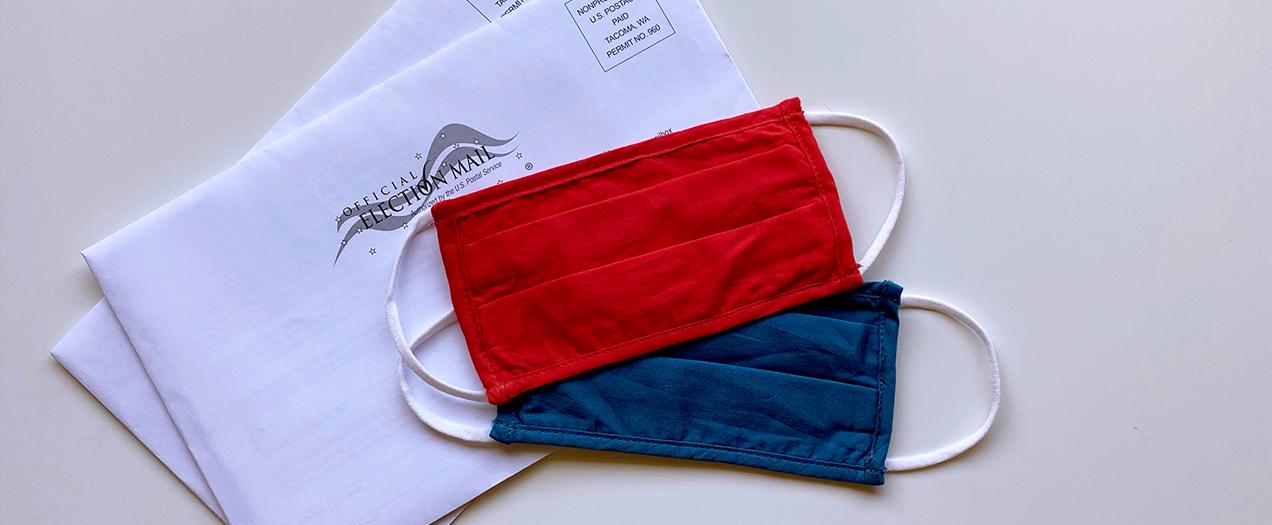Poll: Pandemic Views Fall Along Party Lines

Galloway, N.J. - Most New Jersey adults see COVID-19 as a major threat. But beyond that, their feelings about the coronavirus pandemic and government’s response to it are strongly colored by partisan political feelings, according to Stockton University Poll results released today.
Eighty percent of respondents said the COVID-19 pandemic represents a major problem, while 16% said it is minor and only 2% said it is not a problem at all, the poll of 721 New Jersey adults conducted Oct. 7-13 found.
A majority of 55% said the measures taken by state government to control the spread of the virus were “just right” to meet the problem. Nearly one in four respondents said the measures taken by the state went “too far,” and 18% said they didn’t go far enough.
New Jersey Gov. Phil Murphy received higher marks than President Donald Trump in how they handled government’s response to the pandemic. More than half (54%) gave positive ratings to the governor, while only one in three did for the president. A majority (55%) rated Trump’s response as poor.
|
Rate COVID-19 response: |
Excellent |
Good |
Fair |
Poor |
|
Governor Murphy |
25% |
29% |
23% |
21% |
|
President Trump |
15% |
18% |
11% |
55% |
However, the ratings differed greatly based on partisan political identity. Among those who identified as Republican, 85% gave Trump’s COVID-19 response a positive rating, while only 1% of Democratic respondents did the same. For Murphy, the difference was smaller but still stark, with 77% of those identifying as Democrats giving him a positive rating and 28% of Republicans doing so.
When characterizing the state’s actions on the pandemic, the majority of Republicans said the measures went too far (55%) while only 3% of Democrats thought the same. Most Democrats said the measures were the right course of action (73%).
“Even the pandemic is viewed through a partisan lens in today’s polarized political environment,” said John Froonjian, executive director of the William J. Hughes Center for Public Policy. The Hughes Center operates the Stockton Polling Institute.
“Donald Trump has criticized lockdowns and mask-wearing as he pushed to reopen the economy, while Democratic opponent Joe Biden has embraced such measures. These findings show the extent that the presidential election has influenced opinions on the coronavirus response,” Froonjian said.
He added that other New Jersey polls have found higher approval ratings for Murphy’s response and that these results from an election poll appear to be more influenced by partisan political feelings.
Hughes Center Research Associate Alyssa Maurice noted there were racial disparities in the responses to COVID-19 questions as well. For example, 30% of white respondents said New Jersey’s measures to slow the spread went too far compared to only 3% of Black respondents. Similarly, 41% of white respondents gave Trump’s handling of the virus a positive rating and only 3% of Black respondents said the same.
Though smaller, there were also regional differences, with 32% of respondents in southern New Jersey counties saying the state’s response to the virus went too far compared to 20% of those in northern counties. Southern counties also had more positive views on Trump’s handling of the pandemic and slightly more negative views toward Murphy’s response than their northern counterparts.
A full breakdown of the results of the poll can be found on the Hughes Center Polling Institute website.
Methodology
The poll of New Jersey adults screened as likely voters was conducted by the Stockton Polling Institute of the William J. Hughes Center for Public Policy Oct. 7-13. Live interviewers who are mostly Stockton University students called cell phones and landlines from the Stockton University campus. Opinion Services supplemented the field work by completing 250 telephone interviews. Overall, 93 percent of interviews were conducted on cell phones and 7 percent on landline phones. A total of 721 registered voters were interviewed who were screened as likely voters on criteria including self-professed intention to vote on a scale of 1 to 10, having voted in New Jersey’s 2018 election, and how closely voters are following the election. Both cell and landline samples included a mix of voter list and random digit dialing (RDD) sample. Data are weighted based on U.S. Census Bureau American Community Survey data for New Jersey on variables of age, ethnicity, education level, sex and region. The poll's margin of error is +/- 3.7 percentage points at a 95 percent confidence level. MOE is higher for subsets.
About the Hughes Center
The William J. Hughes Center for Public Policy (www.stockton.edu/hughescenter) at Stockton University serves as a catalyst for research, analysis and innovative policy solutions on the economic, social and cultural issues facing New Jersey, and promotes the civic life of New Jersey through engagement, education and research. The center is named for the late William J. Hughes, whose distinguished career includes service in the U.S. House of Representatives, Ambassador to Panama and as a Distinguished Visiting Professor at Stockton. The Hughes Center can be found on YouTube, and can be followed on Facebook @StocktonHughesCenter, Twitter @hughescenter and Instagram @ stockton_hughes_center.
# # #
Contact:
Diane D’Amico
Director of News and Media Relations
Galloway, N.J. 08205
Diane.D’Amico@stockton.edu
609-652-4593
609-412-8069
stockton.edu/media


